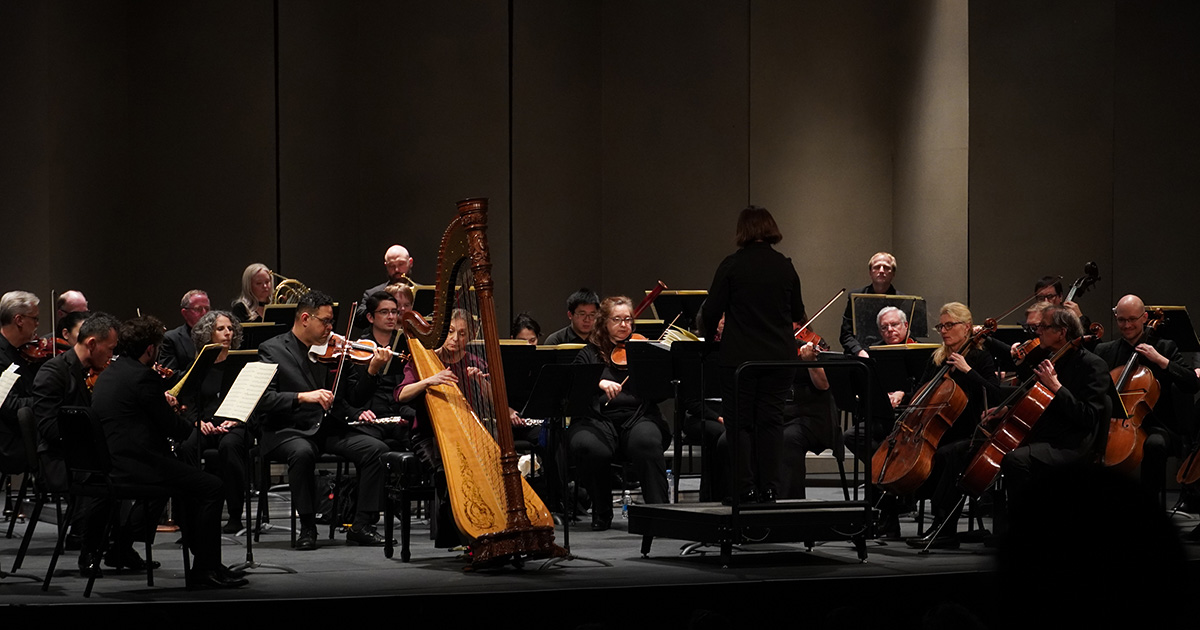For the second season in a row, March was guest conductor month for the Knoxville Symphony Orchestra’s Chamber Classics Series. This past Sunday’s concert at the Bijou found conductor Noam Aviel on the podium for a program that seemed to follow its “Mediterranean Masters” theme on paper, but, in reality, had a delightful textural eclecticism that defied geography. Ms. Aviel’s direction through the afternoon was crisp, accurate, and entertaining, with tempos that bubbled energetically against the richness of the well-balanced chamber orchestra.
This was just the thing for the final work on the program, Ottorino Respighi’s Gli ucelli (The Birds). Although the work dates from 1928, its considerable charm comes from its baroque music inspirations of the 17th and 18th centuries with a gentle twist of the 20th century in orchestration in suggesting birdsong of dove, hen, nightingale, and cuckoo. Aviel’s balance was important here, retaining the flittering lightness from flutes, oboes, piccolo, celesta, and harp dancing against the comforting “baroque” solidity of the full orchestra.

Speaking of the harp, KSO principal harp Cindy Emory was featured in the second work on the afternoon program, the Concierto serenata by Joaquin Rodrigo. One of the assets of the Chamber Classics Series is that it draws on members of the orchestra for its featured soloists, making possible not just the opportunities for musicians, but also opportunities for the audience to hear musical gems that would otherwise go un-programmed. That was the case here—Ms. Emory superbly interpreted the Rodrigo with fresh substance and a delightful command of her instrument’s range. In particular, the first movement charmed with its cheerful and playful modulations.
The second half of the concert began with an interesting musical gem, Eduard Toldra’s Vistes al mar (Sea Views). This three movement work for string orchestra (originally for string quartet) composed in 1920 was perhaps the perfect lead-in to the Respighi. It is based on three sea-related poems by Joan Maragall and is a richly evocative description that benefited from Aviel’s sweeping direction and beautifully lush and sensitive playing from the KSO strings.
Aviel opened the concert with a work that has survived the vagaries of music history, Gioachino Rossini’s Overture to La scala di seta (The Silken Ladder). Setting the stage for the afternoon, Aviel embraced the comic textures and humorous punctuation that would be a hallmark of Rossini just a few years later. The opera itself, the fifth opera written by the then 20-year old Rossini, receives occasional performances mostly as a curiosity. Its lively overture, however, is widely admired as a concert hall program opener due to its scurrying and breathless energy. “Breathless” is perhaps the operative word here, as a passage from it is a notable and challenging audition piece for oboists. In this performance, the KSO’s Ayca Yayman was in the principal oboe chair and turned in a stunningly superb reading.
In fact, Sunday’s concert was a big afternoon for all the woodwinds in the Rossini and the Respighi: Yayman and Jennifer Ownby, oboes; Devan Jaquez and Jill Bartine, flute and piccolo; Duncan Henry, bassoon; and Gary Sperl and Mark Tucker, clarinets.







